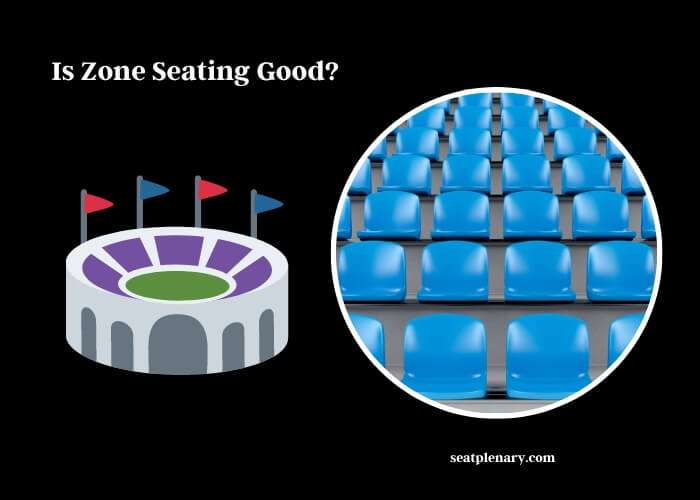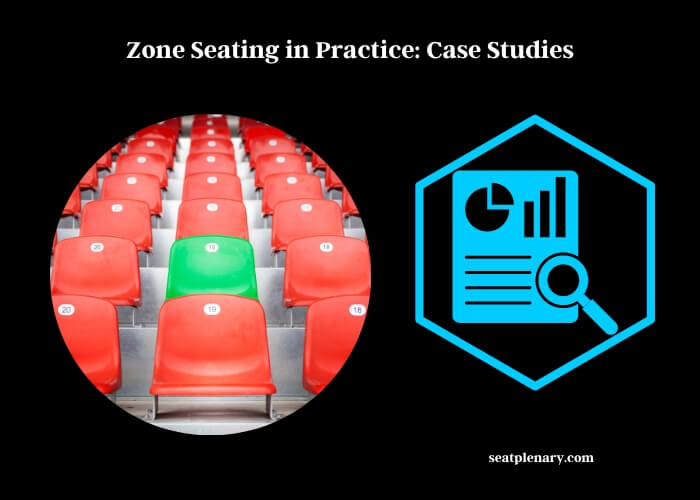Zone seating can be a good choice in many contexts. Its advantages, such as potential for better seats, often make it a preferred choice for event attendees. With a zone seating approach, the seats within the zone are not pre-assigned, giving early attendees the chance to opt for a wider range of available seating options. This could result in securing seats with better views or in more desirable locations.
Let’s delve into some key considerations. First up, efficiency. Zone seating often helps in maximizing the usage of space and the flow of attendees. Moving onto comfort, this model can provide an increased level of satisfaction for the attendees, who have the liberty to choose their preferred spot. Accessibility is another positive aspect. Those with special needs might find zone seating advantageous as they can pick seats that are most suitable for their requirements.
Organization and capacity are important factors as well. With well-managed zone seating, event organizers can efficiently guide the audience to their respective zones, maintaining a smooth flow. This seating arrangement can accommodate more attendees compared to fixed seat assignment, enhancing the capacity. Fairness and convenience are two more factors making zone seating an attractive option. Attendees have the freedom to choose their seats based on their arrival time, which encourages punctuality and rewards early birds.
A key advantage of zone seating is crowd management. By dividing a venue into zones, crowd flow can be controlled effectively, which is especially beneficial during large-scale events. The spatial arrangement of zone seating allows for more efficient use of space, leading to higher occupancy rates. Lastly, ticket pricing can be a pivotal point. Since zones can be priced differently based on their desirability, this can result in affordable options for a wider audience. Thus, zone seating creates a win-win situation for both the attendees and the event organizers.
Zone Seating: Evaluating Its Merits and Demerits

Principles of Zone Seating
Defining Zone Seating
Zone seating is a unique approach to event seating arrangement that segments a venue into distinct zones, rather than assigning each ticket holder a specific seat. Attendees are given the freedom to choose their preferred spot within their purchased zone, typically on a first-come-first-served basis.
The Birth and Evolution of Zone Seating
This innovative seating style traces its roots back to large scale events where managing pre-assigned seating proved to be a daunting task. Over time, it has evolved and has been embraced by different event types, including concerts, theatres, and sports stadiums, offering a versatile seating arrangement that blends structure with freedom.
Overview of Zone Seating Principles and Practices
| Principle | Practice |
| Freedom of Choice | Attendees select their preferred spot within their purchased zone. |
| First-Come-First-Served | The best spots are typically taken by early arrivals. |
| Segmentation | The venue is divided into distinct zones, each with different pricing tiers. |
The Good Side of Zone Seating
The Appeal of Seat Selection
The primary appeal of zone seating lies in the opportunity for attendees to select their seats. For many, the thrill of finding a ‘good’ seat adds to the overall event experience. This freedom to choose may result in securing seats with better views or in more desirable locations.
The Practicality of Flexibility
Zone seating offers flexibility, which is often appreciated in social settings. It allows groups to sit together without the hassle of finding adjacent pre-assigned seats. This ease and convenience contribute significantly to the positive reception of zone seating.
The Value for Money Proposition
Is zone seating good from a value perspective? Yes, it often allows attendees to secure better seats at a lower cost, especially for those who arrive early. This value for money proposition enhances the attractiveness of zone seating.
Pros of Zone Seating and Examples in Real-world Scenarios
| Pros | Examples |
| Better Seat Selection | Early attendees at concerts securing front row spots. |
| Flexibility | Family and friends able to sit together at a sports event. |
| Value for Money | Obtaining prime viewing locations at a theater at a lower tier price. |
The Downside of Zone Seating
Absence of Specific Seat Guarantees
On the flip side, zone seating does not guarantee specific seats. Late arrivals may find themselves left with less desirable options. This trade-off between flexibility and certainty is a factor to be considered.
Potential for Seating Disputes
Zone seating can potentially lead to seating disputes amongst attendees. Since there are no designated seats, arguments can occur over prime locations. Event organizers often need to employ strategies to mitigate such conflicts.
Cons of Zone Seating and Strategies for Mitigation
| Cons | Mitigation Strategies |
| No Specific Seat Guarantees | Clear communication about seating arrangement beforehand. |
| Potential for Seating Disputes | Presence of staff to oversee seating and resolve conflicts. |
Zone Seating in Practice: Case Studies
The Theater Experience
In theater settings, zone seating offers the audience the chance to select seats with the best acoustics or sightlines. It also encourages early arrival, fostering a more engaged audience, ready for the show ahead.

The Concert-Goer Perspective
For concert-goers, zone seating brings an element of excitement. The possibility of securing a front-row spot or a seat near the stage can significantly enhance the concert experience.
The Sports Fan’s View
From a sports fan’s perspective, zone seating allows for better crowd management, especially for larger groups. It offers the flexibility to sit with friends and enjoy the game together, contributing positively to the overall experience.
Alternatives to Zone Seating
Overview of Reserved Seating
Reserved seating is a more traditional approach where each ticket corresponds to a specific seat. This method offers certainty but lacks the flexibility provided by zone seating.
The General Admission Approach
General admission, another alternative, offers complete freedom with no zoning or specific seat assignments. While it maximizes flexibility, it can often lead to chaos, especially for high-demand events.
Comparing Zone Seating with Other Seating Types
Zone Seating vs. Reserved Seating vs. General Admission
| Seating Type | Pros | Cons |
| Zone Seating | Flexibility, Potential for better seats, Value for money | No guaranteed specific seats, potential for seating disputes |
| Reserved Seating | Guaranteed specific seat | Lacks flexibility |
| General Admission | Maximum flexibility | Potential chaos |
Factors to Consider in Choosing a Seating Type
Several factors play a role in choosing a seating type. The nature of the event, the size of the venue, and the expected audience can all influence this decision. It is up to the event organizers to weigh these factors and decide which seating type would best suit their needs.
FAQs
What Does Zone Seating Mean at a Concert?
Zone seating at a concert means that attendees are not assigned specific seats but are given access to a specific zone. Within that zone, they are free to choose their preferred spot on a first-come-first-served basis.
Can Zone Seating Be Beneficial?
Yes, zone seating can be beneficial as it allows for greater flexibility and potential for better seat selection. Especially for early attendees, they can secure spots with superior views or more desirable locations.
Are Vivid Seats Legit or Not?
Yes, Vivid Seats is a legitimate ticket marketplace known for providing tickets to concerts, theater, and sports events. Like any online marketplace, it’s recommended to read reviews and understand their policies before purchasing.
Why Does Zone Seating Often Appear in Concerts?
Zone seating often appears in concerts because it offers a balance between organized seating and freedom of choice. It allows concert-goers to choose their preferred spot, fostering a sense of excitement and engagement.
What is Zone Seating Vivid Seats?
Zone seating on Vivid Seats refers to the ticket category that grants access to a specified zone within a venue. Attendees can freely select their seats within this zone, offering a flexible approach to event seating.
What Are Zone Seating Tickets?
Zone seating tickets are tickets that do not assign a specific seat to the ticket holder. Instead, these tickets grant access to a particular zone within the venue, and the ticket holder can choose any available seat within that zone.
What are the Benefits and Drawbacks of Zone Seating in a Theater?
Zone seating in theaters offers several benefits for moviegoers. Firstly, it allows viewers to choose their preferred seating area based on their personal preferences, whether it’s the front, middle, or back of the theater. This ensures a comfortable experience and optimal viewing angle. However, a drawback of zone seating is that popular spots may get filled quickly, leaving latecomers with limited options. It’s important to arrive early to secure the desired zone.
Does Zone Seating Result in Seating Disputes?
While zone seating offers flexibility, it can potentially lead to seating disputes, particularly for high-demand spots. Event organizers typically employ strategies, such as having staff oversee seating, to mitigate any possible conflicts.
Read more:
- Floor Seats at Concerts: Pros, Cons and Practical Tips
- Premium Seating Options at Cheney Stadium
- Bringing Chairs to Riverbend Concerts: A Detailed Guide
- Are Front Row Orchestra Seats Good?
- Silverado Seating Switcheroo: Identifying Interchangeable Seats Across the Years
- Rain-Soaked Car Seats? Simple Steps to Dry Them Out
